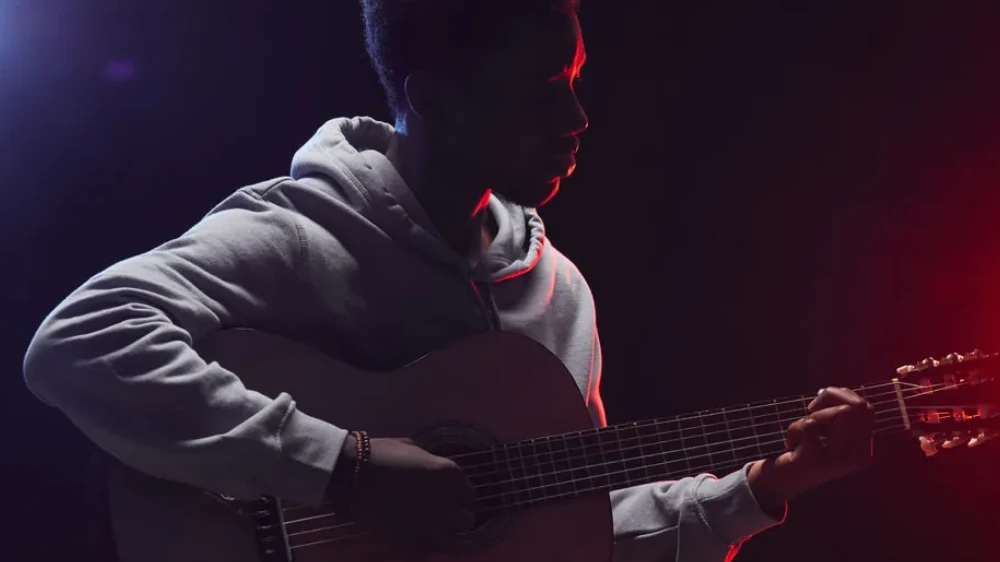
Music is highly accessible and provides mental health therapy for both creators and listeners
Whatever your preferred genre. It’s never about shutting the world out, but seeing it through new eyes. Escaping into a world of ideals through music is healthy. While traditional protest songs or poetry are designed for a communal setting, the job of recorded music is to re-energise our personal self-worth. To explore crazy daydreams, scenarios and shape a belief system.
The reality, is that most people never listen to music, not that they don’t like it, there’s simply no time. Music is not taken seriously enough, especially in education.
Though we might feel despair amidst a climate crisis, we can use music to inspire us to help change things. While I don’t sing songs, my guitar is still a voice with an emotional brain attached, and playing an instrument has mental health benefits too. I can pick the guitar up and create a new song within a couple of hours. Whether it’s any good is another matter. But I don’t have to wait long for the next idea. Listeners get the same sense of progress when switching playlists. We’ll select the music that fits our mood.
It’s healthy to experience a variety of emotions and recorded music provides an outlet for this.
We deprive our minds of fresh perspectives if we live in total silence. Music can also be a disturbance, which is more likely due to other unwanted distractions. Nobody really hates music, they just can’t find the time. It’s astonishing how music is often ignored by psychologists and mental health improvement guides. It’s not always simply about relaxation either. It’s healthy to experience a variety of emotions and recorded music provides an outlet for this. Music really helps depression, but in the present disruptive, ad-driven digital space, there appears little room for music.
Creative thinking, whether in business or art, is tough work because our primitive brains are still wired to focus on threats and survival. We solve complex problems in science and design by training our minds. We might struggle to learn music theory, because the mental work requires dedicated rational thinking. Music is also about practice, repetition until you know enough to improvise, be more creative.
Popular music artists often use mental models, instead of sheet music. We commit chord shapes and scale positions to memory.
Music creativity provides a great workout for the rational brain, that benefits listeners on an emotional level
Why did I have to choose the most difficult hobby of all, music? Writing and recording music consumes your entire mental capacity and can be very anti-social. I really enjoyed the days of gigging with a band, and might do it again some day. My rational brain needs constant stimulus, so managing a music project keeps me sane. I am fortunate in that I don’t have to commute everyday, a choice I made over ten years ago. I’ve since made a living, running my own web design business from home. Though it’s been a tough couple of years, so feel like I need a change.
I do use my rational brain more than most, perhaps too much. I’m not very good at sitting around, waiting for inspiration, though it’s been tough going learning how to write coherent articles like this one. Music is the least fashionable topic right now, unless we are talking about oldies. The supposedly modern digital age seems to be obsessed with nostalgia, making it harder for new artists to get airplay. Music is deeply undervalued by the tech industry and neglected in education. The cognitive and emotional benefits of music really improves your quality of life.
Spotify have artists over a barrel, because the majority of listeners are now conditioned to pay a minimal monthly fee for access to the entire history of recorded music
So I must be insane doing music, when all the surrounding, digital forces are moving against the enjoyment and escapism that great music has to offer. I’m a big endorser of Bandcamp, the real home for music in the digital era. The artist or label gets paid 80% or more of what they make on sales. Streaming is a real killer for musicians, though you can’t ignore it. Spotify have artists over a barrel, because the majority of listeners are now conditioned to pay a minimal monthly fee for access to the entire history of recorded music – new music easily gets drowned by oldies.
Things are changing though, I sense a shift towards business models that provide a better deal for creators. Bandcamp has a visibility problem, it still feels like a space for record collectors and hardcore fans. The wider listening public don’t know it exists and view it largely as a place to buy physical records. Though you can stream music via the Bandcamp app, just like Spotify or Apple Music. Most indie artists release digital albums, which you can download or stream. There’s plenty of room for improvement in how digital music is packaged, that also pays the artist fairly.